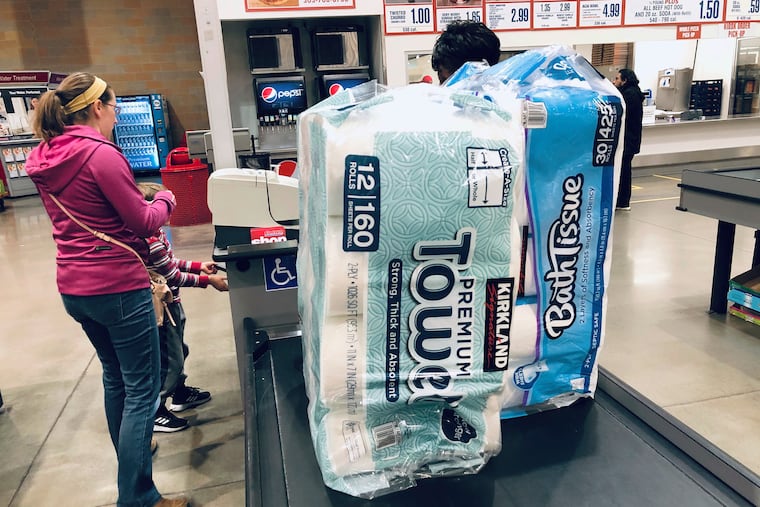Toilet paper, paper towel panic-buying came back in parts of the Philly area
The port strike caused some consumers to stock up, despite the fact that most of these products are made domestically.

When Ashley South walked into the Costco in Lawrence Township, N.J., on Wednesday, she wasn’t expecting to get flashbacks to the height of the coronavirus pandemic.
But then she heard employees alerting customers that various paper products, including toilet paper and paper towels, were sold out.
The next day at the Langhorne Sam’s Club, she said the scene was similar, mirroring national reports of panic buying because of the East Coast dockworkers’ strike.
“I’m just like, ‘Seriously? I guess people don’t know how this all works,” said the 30-year-old Levittown resident. “People were cutting each other off at the self checkout. It looked like Thanksgiving-busy.”
While the supply and price of perishables and other imported goods could eventually have been impacted by the strike, most paper products in local store aisles are produced domestically, according to company officials.
But that didn’t stop some customers from stocking up out of fear — sometimes fueled by social-media scuttlebutt.
» READ MORE: ‘Nothing’s going to move without us’: Port workers in Philadelphia and across the East Coast go on strike
“It feels like shoppers are returning to their pandemic playbook,” Leslie G. Sarasin, president and CEO of FMI the Food Industry Association, said this week in a statement. “And we should anticipate more of this impulse-purchase behavior as the strike persists, especially as rumors play out in private forums and on social media.”
The strike of tens of thousands of members of the International Longshoremen’s Association (ILA) on the East and Gulf Coasts began at 12:01 a.m. Tuesday. Dockworkers in South Philadelphia and Camden were among those who walked off the job, marking the union’s first strike in almost 50 years. On Thursday afternoon, the union of 45,000 dockworkers reached a deal to suspend their strike until Jan. 15 to provide time to negotiate a new contract.
If the strike had continued, experts said consumers could have felt an impact, including on the price and availability of fruits and vegetables that come through Philadelphia and Camden. Any impact would not have been felt significantly for several weeks.
In Pennsylvania and New Jersey, ShopRite stores have seen an increased demand for paper products, while Sam’s Club is seeing “elevated demand for certain items — most of which are manufactured in the U.S.,” spokespeople said. Some grocers are more wiped out than others, according to customer reports on social media, and others seem to be experiencing no issues with panic-buying.
As of Thursday, Giant stores in the region had their normal supply of fresh foods, with no immediate concerns about product availability.
“We have been preparing for this situation and continue to be in close dialogue with our vendors and suppliers, including local suppliers, to ensure our stores are stocked and ready to serve customers,” spokesperson Ashley Flower said in a statement. “While it is too early to speculate on the long-term impact to our supply chain if the strike is prolonged, at this time, we expect minimal impact on our supply chain.”
A spokesperson for Albertsons, which owns Acme, declined to answer questions, directing reporters to reach out to FMI, the trade organization representing grocers and wholesalers. Costco did not return requests for comment.
In Levittown, South, a stay-at-home mother of two young boys, said she’s just grateful she makes it a habit of keeping extra toilet paper and paper towels in the closet.
This article includes information from the Associated Press.